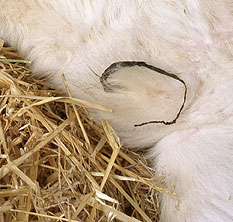Healthy Calf Conference
Follow to stay up-to-date on all Healthy Calf Conference updates. Speaker announcements, sponsorship information, registration announcements, and more.

A calf must be born in a clean calving area. If it isn’t, it is at a higher risk for a navel infection, also called joint ill.
The navel is the gateway to the liver. Bacteria enter a calf’s circulatory system by way of the navel into the liver, and then into the bloodstream. Navels should be dry, thin and not swollen.
The navel should be palpated every day for two weeks to check for swelling or pain, which would indicate there may be a sign of a navel infection. There should be no drainage or foul smell, nor should palpation cause a painful response from the calf.
Preventing navel infections in newborns
The umbilical cord is made up of blood vessels that, after calving, remain like hollow tubes where bacteria can enter the calf, and get into the bloodstream. Once in the bloodstream, the bacteria can circulate throughout the calf’s body, causing diseases like septicemia (blood infection), meningitis (brain infection) and arthritis (“joint ill”, swollen joints).
Navel infections: easily identifiable, often overlooked
Unnoticed and untreated navel infections are thought to contribute to the high mortality and morbidity rates on veal farms. One study of calves at sales barns found 51.6 per cent of the calves had slightly enlarged or swollen navels.
How to determine the severity of umbilical hernias
Umbilical hernias are the most common birth defect in calves. They occur when the umbilical ring fails to close after birth, allowing abdominal contents to protrude through the opening. Umbilical hernias vary in severity from those that will spontaneously heal to those that will need surgical repair. But how do you determine whether it is severe and requires surgery or not?
Septicemia: the silent killer
Septicemia occurs when bacteria enter the bloodstream and circulate throughout the body.
They can cause damage to internal organs, resulting in the calf’s death due to multiple organ failures. Typically, bacteria gain access to the blood as a result of other infections, such as navel infections, pneumonia or diarrhea.
Follow to stay up-to-date on all Healthy Calf Conference updates. Speaker announcements, sponsorship information, registration announcements, and more.
The Codes of Practice are nationally developed guidelines for the care and handling of farm animals. They serve as our national understanding of animal care requirements and recommended practices.